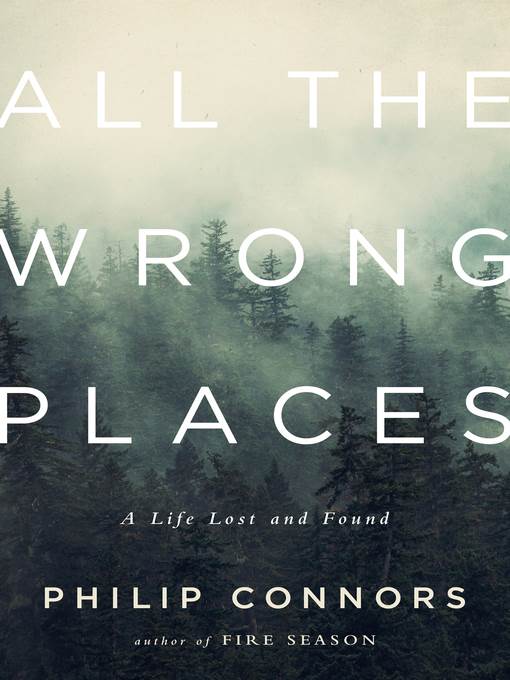
All the Wrong Places
A Life Lost and Found
کتاب های مرتبط
- اطلاعات
- نقد و بررسی
- دیدگاه کاربران
نقد و بررسی

November 24, 2014
Family trauma sends a young man drifting through many incongruous settings in this affecting but sometimes aimless memoir. Connors, who recalled his stints as a fire lookout in Fire Season, here revisits the period before he entered the wilderness—a time of searching (mostly in vain) for answers to the riddle of his brother’s suicide at the age of 22. His path takes him to New York, where he is a fish out of water, working at the Wall Street Journal despite his socialist leanings and living in the Bedford-Stuyvesant section of Brooklyn, where his white skin makes him an object of baffled wonder in an all-black neighborhood. Emotional connections with other people are fitful: one serious love affair fizzles when his girlfriend suffers a psychotic break and proclaims herself “the female Jesus,” and an amateur phone-sex line provides one-night-stands whose tenderness is overshadowed by her broodings about death. Connors’s narrative, like his state of mind at the time, feels pulled in many directions: he gives sharply funny observations of the culture at WSJ, soap-boxes against its right-wing editorial line and the Iraq War, and ruminates on yuppie bachelorhood in the big city. Through it all his subtle, evocative prose and depth of feeling carry readers through the eddies of his story.

Starred review from December 15, 2014
Connors (Fire Season: Field Notes from a Wilderness Lookout, 2012) reflects candidly on the years he spent unmoored after a family tragedy; he continuously found himself in places he felt apart from. "A natty socialist at the Wall Street Journal. A white guy in a black neighborhood. Strange how comfortable my discomfort became," writes the author, who, at the age of 23, after the shocking death of his brother, turned completely inward, "a man shrouded in almost total self-regard." As Connors struggled to find a place for his pain where it wouldn't devour him, he stumbled into a career in journalism, even after he convinced himself he had given up on the business. "But the fact was I'd borrowed twenty-five grand to pay for an education in print journalism," he writes, "so I had little choice but to pursue a career in print journalism." At his desk in the Leisure & Arts section of the WSJ, surrounded by conservative editorial writers, Connors proudly displayed his left-wing politics by hanging posters of Emma Goldman and Ralph Nader. He had passionate, failed affairs and emotionally charged encounters with his neighbors as one of the only white faces in his Bedford-Stuyvesant neighborhood. Connors' missing sense of purpose is keenly felt through passages that combine lyricism with dark humor to draw lines between grief and the uncanny. His search toward understanding his brother's death-which included studying graphic images from the autopsy report and reaching out to his brother's ex-girlfriends-ultimately ends in a place of belonging. But the redemptive ending of this story, which Connors smartly does not dwell on, is far less compelling than the unique and brutally raw accounts of his search for connection. Unlike other, neater narratives of being lost and found, Connors' story-told with harrowing insight and fierce prose-is messy and incomplete and makes no apologies for being anything but.
COPYRIGHT(2014) Kirkus Reviews, ALL RIGHTS RESERVED.

February 15, 2015
Connors follows up his debut, Fire Season (2011), with a poignant memoir that rivals its predecessor's joyful radiance. After his younger brother kills himself, Connors attempts to bury his deep-seated agony in sex, socialist politics, and the pursuit of literary success. But no matter where Connors goes, he never feels at home, nor can he escape his obsession with suicide. Fleeing the midwestern farmlands where he was born and raised, Connors spends his college years drifting between school in Montana and a journalism internship in New York City. After landing a gig at the Wall Street Journal, where his socialist leanings are put to the test, Connors begins questioning his life's direction. He takes up residence in a predominantly black neighborhood, finds emotional comfort in phone-sex communities, and falls in love with a woman who turns out to have messianic ambitions. He then returns to New Mexico, where his brother shot himself, to face his fear of death and loneliness. Connors' chronicle of his long search for contentment is wise, funny, and life affirming.(Reprinted with permission of Booklist, copyright 2015, American Library Association.)

























دیدگاه کاربران